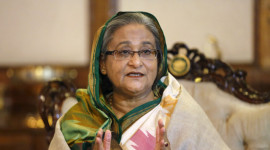
This exchange of blame is just a beginning as these comments are based on initial intelligence-based assessments. To determine what actually happened, a thorough international investigation will have to be carried out. More blames regarding the ‘tampering with evidence’ and ‘allegations without proof’ are likely to ensue. But the incident has re-emphasised the volatility of the situation that emerged after the violent change of regime in Ukraine.
Given the 200 years of Russian engagement in Ukraine, its influence over the strategically important state is significant. Losing such an important state, which was formerly a part of the USSR to the West, was too much for the Russians to digest. As the time passes, new dimensions, many of them unintended and unpredicted, are adding up to the crisis. Ukraine’s territorial integrity has already gone, further territorial adjustments will follow as ethnic Russians of the eastern regions are not willing to be ruled by Kiev any more. The shooting of the Malaysian airliner, causing causalities which include people from multiple nationalities, has internationalised the crisis, which so far was predominantly a regional one. More sanctions on Russia will further deteriorate its relations with the West, whom Russia accuses of having instigated the crisis at the first place. Meanwhile, enhanced international pressure that seems to have been built by the Western media will further push the Bear to the wall.
This brings us to the larger issue: the West’s policy of interference. This policy has consequences which augur not so well for world peace and stability. Firstly, with a more assertive Russia under Putin back on world stage, and a relatively weaker US, shadows of the Cold War appear to be creeping in again.
Secondly, the pattern of outcome all over the world, be it Eastern Europe, the Middle East or South Asia, is strikingly similar. The West’s interference, with the US having the lead role, be it in the form of direct intervention or covert support, in existing states is creating new crises, giving birth to local resistance, creating instability and threatening the Balkanisation of states. As a result, the post-World War II map of the world is being redrawn in different regions.
The world’s balance of power has fast shifted from unipolar to multipolar with the emergence of a rather friendly EU, more confident and hostile Russia, economically and militarily upgraded China and an ambitious India. In this new world reality, encroaching upon the settled states and pricking the different spheres of influence may lead to long-drawn hostilities, causing humanitarian crises with potential dangers to world peace.
Published in The Express Tribune, July 23rd, 2014.
Like Opinion & Editorial on Facebook, follow @ETOpEd on Twitter to receive all updates on all our daily pieces.
COMMENTS (3)
Comments are moderated and generally will be posted if they are on-topic and not abusive.
For more information, please see our Comments FAQ



1730965998-0/BeFunky-collage-(27)1730965998-0-165x106.webp)
1731933289-0/BeFunky-collage-(68)1731933289-0-165x106.webp)












With only minor qualifications I agree with the main article, Strategic Asset, and Prabhiyot Singh Madan. The big problem anyone faces when attempting to analyze world problems in a small article is how to include everything, and obviously that is virtually impossible.
It would appear to me that the US/Israel duo and their compliant Western puppets such as Australia, Canada, UK, EU are creating most of the problems, and I am not certain where Saudi and a couple of others come into the picture.
So far, India, China, Russia, which are very powerful and productive have created few problems in recent times although they have the potential to be troublesome if they wished. There are others such as Pakistan, Japan and Indonesia.
Most of the world problems started in the 1990s after Russia backed out of the cold-war and the US started flexing its muscles. Since then it has attacked Afghanistan, Iraq, Libya, and has been continuously creating mischief in Syria, Iran, Palestine, Georgia and now Ukraine. I will not go too far into the other 30 odd countries America has seriously interfered with such as Korea, Vietnam and many in South America, Cuba and Africa.
Most people ignore economic reality such as the Bretton Woods financial arrangement (US dollar is major beneficiary). However, most of the recent world problems seem to have been inherited from America's determination to maintain control over the world money system. Hence, America was not happy with Iraq, Iran, Syria, Libya, and then Ukraine until an illegal coup d'etat took control. Now the BRIC countries such as Brazil, Russia, India and China are attempting to move off the dollar standard so trouble will continue for some time.
People think that wars are all about factors such as pride, religion, losing a little territory or an Arch Duke being assassinated. These are just emotional factors used by the power brokers in places such as America, UK to get the little people onside. With odd exceptions the main reasons for war are economic, together with control.
Russia is simply trying to safeguard itself from the rapid expansion of NATO influence from its borders. Russia is India's closest friend from the cold war times and an allie. We abstained from voting against Russian annexation of Crimea and endorsed the view of a peaceful negotiation between the ukrainian and Russian federation and hope that Ukrainians understand their situation amicably. Rab rakha
The world’s balance of power has fast shifted from unipolar to multipolar with the emergence of a rather friendly EU, more confident and hostile Russia, economically and militarily upgraded China and an ambitious India.
Pray tell me, what indicated to you that India is ambitious? At this time, India has not much to gain by inserting itself into extraneous matters that would likely antagonize its relations with US or Russia.
China may have upgraded militarily and economically, but it has never been tested in a war with western powers. Would China seriously risk antagonizing the West, especially the US, is a trillion dollar question.
Russia may be more confident, but the world also sees Putin as a maverick and his sole version of events would be seen as unreliable.
Despite multiple warnings from Russia, US started this bout by expediting Ukraine's entry into NATO. The fact is that Ukraine has multiple sites of strategic importance for the Russians such as Sevastopol that Russia could not tolerate a Cold War relic such as the NATO at its doorstep.
The Russian theory is that the plan was struck by an air-to-air missile over rebel-held territory. Unless and until there is conclusive proof for one of the two theories, I doubt we live in the pre-Iraq war mindset where we simply accept US assertions of the plane being shot down by a Buk missile.